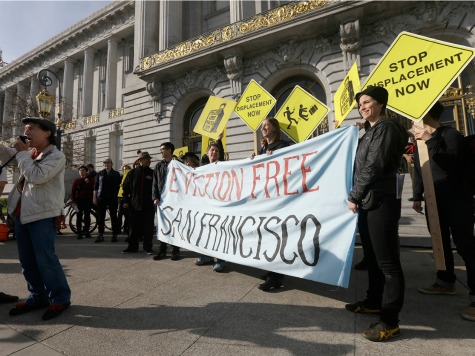
Buses are usually favored by progressives as a means of green, efficient transportation. In San Francisco, stopping some private buses has become the goal of a new lawsuit filed by a coalition of progressive activists.
Tenant activists going under the name Coalition for Fair, Legal and Environmental Transit were joined by an SEIU local and two individuals in a lawsuit against the city. This is just the latest step in an ongoing series of protests against the buses which have led to street protests and, in once case, violence.
The large private buses cruise through the city’s Mission district picking up tech workers and taking them out of the city to places like Google’s headquarters. Activists say the buses are making possible the gentrification of the city, causing rents to go up and leading landlords to seek ways around rent control in order to charge more for their properties.
Sara Shortt, who is one of the plaintiffs in the suit, is the head of a tenant advocacy group called Housing Rights Committee. Shortt told the San Francisco Chronicle, “What the buses do is facilitate the ability for highly paid techemployees to live in our city who otherwise would not, and when we havean extremely limited pool of housing stock available, what that does ispush folks at the lower income levels out of the city.”
Protests against the buses have been going on since late last year. A Bay Guardian video report shows one of the first protests which involved activists in reflective jackets getting on the bus and then ignoring requests to leave:
A second protest, during which one of the buses was blocked in the street, was held a few weeks later. Police eventually removed protesters and allowed the bus to leave. More recently, a group of acrobats dressed in Google colors blocked another bus.
One of the complaints raised by the protesters is that the tech buses–they are often referred to collectively as Google buses–were using city bus stops without any kind of authorization. Activists pointed out that there was a $271 fine for parking a private vehicle at a city bus stop and calculated that the Google buses owed the city one billion dollars.
The San Francisco Municipal Transportation Agency Board appeared to respond to this concern a few weeks later by approving a pilot program which would allow the Google buses to use city bus stops but would require them to pay about $1 per stop for the privilege. The pilot program was expected to raise about $1.5 million for the city.
The activists filed an appeal in February claiming that the pilot program would first need to be reviewed under the California Air Quality Act to assess its impact. The activists’ attorney, Richard Drury, told the Bay Guardian, “CEQA actually identifies displacement as an environmental impact… Honestly I didn’t know that, until I started researching all of this.”
In early April the SFMTA Board held a hearing during which Drury described the buses as “pirate shuttles.” “We’re bussing wealthy, predominantly white adults into low-income neighborhoods, where they in turn displace low-income people,” he told the board.
Supervisor Scott Wiener defended the shuttles and criticized the appeal, saying, “There’s a certain set of assumptions that technology workers are notreal San Franciscans. That they’re part of some invading force that isnot part of the city, and aren’t one of us.” After six-and-a-half hours of talk, the board voted 8-2 to move ahead with the pilot program without the environmental review.
Supervisor David Campos is one of the people who voted in favor of the environmental review. Campos has also led protests against a tax break for tech companies like Twitter which have also been accused of gentrifying the city. The tax break was passed after Twitter announced it was leaving the city because of high payroll taxes. Indeed, this is one major reason why so many tech companies like Google are located outside the city and therefore need buses to shuttle employees to work.
The pilot program for Google buses is scheduled to begin July 1st.

COMMENTS
Please let us know if you're having issues with commenting.